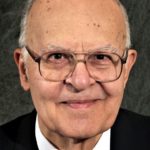James Leo Garrett, a renowned Southern Baptist scholar and teacher remembered as one of the last “gentleman theologians,” died Feb. 5 in Nacogdoches, Texas. He was 94.

James Leo Garrett
“Dr. Garrett personified the best of Baptist scholarship for more than two generations of Baptist leaders in the U.S. and around the world,” said Preben Vang, a New Testament professor and director of the doctor of ministry program at George W. Truett Theological Seminary.
Born in Waco, Texas, in 1925, Garrett professed faith in Jesus Christ at age 10 and was baptized at Seventh and James Baptist Church. He graduated from Baylor University in 1945 and was president of the centennial class.
He was ordained to the ministry by First Baptist Church in Waco and in 1948 received his bachelor of divinity from Southwestern Baptist Theological Seminary, was elected to teach there and married fellow Southwestern graduate Myrta Ann Latimer.
In 1954 he received a doctorate from Southwestern Seminary after writing a dissertation on the theology of Baptist scholar W.T. Conner. He attended his first Baptist World Alliance meeting in 1950, beginning a 50-year association with the group, including chairing the Commission on Cooperative Christianity from 1968 to 1975.
Garrett taught a combined 28 years on the faculty of Southwestern Seminary, ultimately as distinguished professor of theology; 24 years at Southern Baptist Theological Seminary and six years at Baylor as director of the J.M. Dawson Institute of Church-State Studies.
In addition to degrees at Baptist institutions, Garrett received a master’s in theology from Princeton Theological Seminary in 1949 and a doctorate in church history from Harvard University in 1966. In 1965, he attended the final session of the Second Vatican Council in Rome.
Beyond the classroom, Garrett taught through his writings including his detailed two-volume Systematic Theology: Biblical, Historical, and Evangelical and exhaustive, Baptist Theology: A Four-Century Study.
Nicknamed “Machine Gun Garrett” because of his rapid-fire lecturing style, his legacy remains strong on both sides of the debate over biblical inerrancy that divided the Southern Baptist Convention near the end of the 20th century.
Malcolm Yarnell, research professor of systematic theology at Southwestern Baptist Theological Seminary, called him “the last of the gentleman theologians,” a term coined by historian E. Brooks Holifield to counter the stereotype of southern ministers as poorly educated and emotional revivalists by demonstrating the reasonableness of the Christian religion.
“Dr. Garrett personified the best of Baptist scholarship for more than two generations of Baptist leaders in the U.S. and around the world.”
Carey Newman, an academic book editor and former professor who for nearly two decades served as director of Baylor University Press, labeled Garrett “a scholar’s scholar.”
Steven Harmon, associate professor of historical theology at Gardner-Webb University, viewed Garrett as his “doctoral mentor.”
David Dockery, president of the International Alliance for Christian Education, recognized Garrett as “the premier Baptist theologian of the second half of the 20th century.”
Wyman Lewis Richardson, pastor of Central Baptist Church in North Little Rock, Arkansas, and editor of The Collected Writings of James Leo Garrett Jr., 1950-2015, called Garrett “a fascinating mixture of Southern Baptist loyalty and ecumenical fervor.”
As early as 1954 Garrett cautioned Southern Baptists about “how to keep a strong biblical faith and message without succumbing to the tendency to make the ‘pet’ interpretations of some the test of fellowship for all.”
In 1991 he warned that believers’ baptism by immersion and religious freedom for all were becoming “endangered Baptist beliefs,” due to the increasing baptism of young children and “majoritarian Baptists” who seek or sanction special civil privileges for particular religious groups and their members.
A third distinctive, cooperative missions, Garrett said, faced a dual threat “from those who would manipulate and control the agencies of the cooperative mission enterprise to the disenfranchisement and exclusion of their fellow believers, and from those who would withdraw from the cooperative mission enterprise in impatient, despairing and schismatic abandon.”
His wife, Myrta, preceded him in death. He is survived by three sons, four grandsons and three great-grandchildren.
